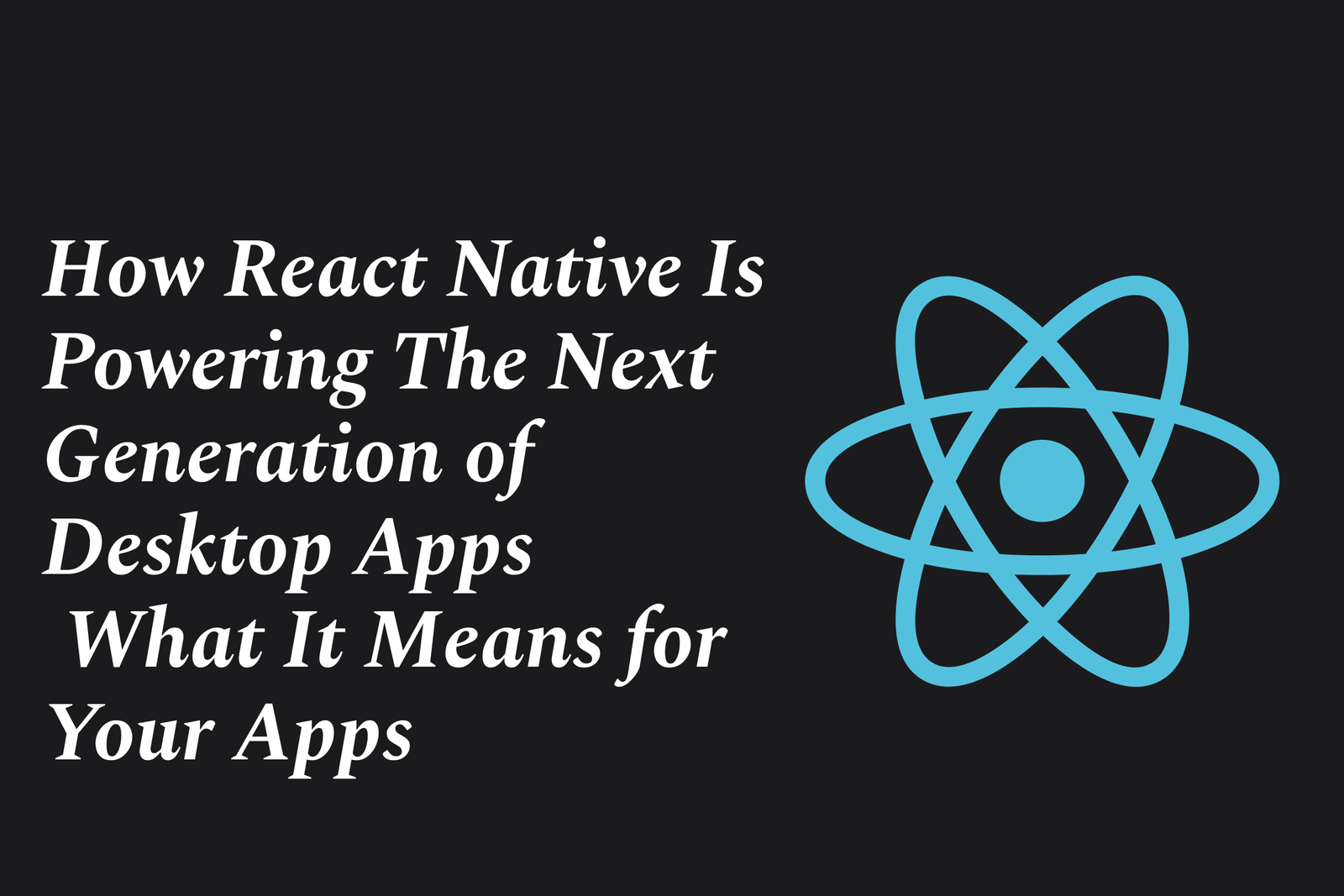How React Native is Powering the Next Generation of Desktop Apps
React Native extends beyond mobile to power next-gen desktop apps by enabling cross-platform development with reusable components, seamless integration with tools like Electron, and native-like performance, making desktop app creation faster, efficient, and scalable for modern user experiences.
How React Native Is Powering The Next Generation of Desktop Apps
1 ) React Native's Expanding Reach Beyond Mobile
React Native, initially developed for mobile app creation, has broadened its scope significantly to power desktop applications. Big tech companies like Meta (Facebook), Microsoft, Amazon, Shopify, and Wix leverage React Native to build cross platform desktop experiences alongside mobile apps, demonstrating its flexibility and robustness.
2 ) Cross Platform Development Efficiency
React Native allows developers to write once and deploy across multiple platforms including iOS, Android, Windows, and macOS. This capability streamlines development processes by reusing components, reducing duplication, and accelerating delivery of consistent user interfaces on desktop and mobile environments.
3 ) Integration with Popular Technologies and Ecosystems
React Native seamlessly integrates with widely used frameworks and tools such as Electron for desktop app packaging, enabling developers to harness the power of web technologies (JavaScript, HTML, CSS) to create rich desktop applications. The ecosystem also supports native module extensions and advanced tooling like React Server Components and concurrent rendering for performance optimization.
4 ) Trusted by Industry Leaders for Desktop Applications
Numerous high profile desktop apps are built using React Native and Electron, including Microsoft Teams, Messenger Desktop, Amazon Shopping, and the Meta Quest app. These apps benefit from React Native’s modular architecture, allowing them to maintain large scale codebases efficiently while delivering native like performance.
5 ) Robust Developer Experience with Modern Tooling
Developers working with React Native enjoy features like hot module replacement (HMR), flexible plugin architectures, and strong community support. Toolkits like Electron Forge and Electron Fiddle further simplify desktop app development and experimentation, lowering the barrier to entry for building native feeling desktop apps with React Native.
6 ) Future Proofing Through Open Source and Community
React Native’s open source nature and vibrant contributor community ensure ongoing improvements and innovations. This continuous development, combined with backing from major corporations, guarantees that React Native will keep evolving to meet desktop app demands with enhanced performance, security, and developer productivity.
Summary:
React Native is fundamentally transforming desktop app development by enabling cross platform capabilities, seamless integration with web and native technologies, and providing strong performance and developer tooling. As a result, it powers a wide range of modern desktop applications, driving the next generation of applications that combine native responsiveness with the speed and flexibility of React.
https://justacademy.in/news-detail/google-android-ecosystem-partnerships
https://justacademy.in/news-detail/android-app-developer-conference-highlights
https://justacademy.in/news-detail/why-react-native-is-still-crushing-cross-platform-development-in-2025
https://justacademy.in/news-detail/flutter-web-performance-benchmarks
https://justacademy.in/news-detail/what’s-deprecated-in-flutter-2025
Related Posts
Java supports GDPR and data privacy by enabling secure data handling through encryption, controlled access, and precise data management. It allows developers to minimize PII exposure, ensure data confidentiality, and design workflows that comply with data protection regulations effectively.
Java code quality tools have evolved to include advanced static analysis, integrated security checks, and AI-powered code reviews. These updates help developers detect bugs, enforce coding standards, and enhance security, streamlining the development process and improving overall code reliability.
Java remains a cornerstone in big tech companies, evolving with modern features like records, pattern matching, and virtual threads. Its robust ecosystem, enhanced performance, and growing AI integrations keep it vital for both legacy systems and innovative new projects.
Java and CI/CD pipeline optimizations streamline Java application development by automating builds, tests, and deployments. They improve efficiency through parallelization, caching, and secure secrets management, enabling faster feedback loops and more reliable, scalable software delivery.
Java supports modern cryptography standards through its flexible Java Cryptography Architecture (JCA), enabling integration of advanced algorithms like AES, EdDSA, and post-quantum tools. Libraries like Bouncy Castle offer FIPS-certified, hardware-accelerated implementations for secure development.
Java 23 enhances record patterns by enabling concise, direct destructuring of record components within pattern matching, simplifying type checks and data extraction. This improvement boosts code readability and expressiveness by reducing boilerplate in handling immutable data classes.
Java remains a top choice for mobile app backends, powering scalable, secure, and high-performance server-side solutions. Latest trends include cloud-native microservices, reactive programming, and enhanced JVM optimizations, enabling efficient, flexible, and robust mobile backend development.
Java SE 24 and LTS Java SE 21 offer enhanced features and performance, while Apache Spark 4.0.0 introduces Scala 2.13 support and advanced ML and SQL capabilities. Together, they empower developers to build scalable, high-performance data applications with modern tools.
JUnit 5 modernizes Java testing with a modular architecture, improved assertions, and seamless Java 8+ support. Beyond JUnit, tools like Mockito and AssertJ enhance mocking and assertions, creating a powerful, flexible ecosystem for writing clean, efficient Java unit tests.
Java plays a pivotal role in cloud automation tools by providing a robust, platform-independent language used to build scalable automation frameworks like Jenkins and Selenium, enabling efficient CI/CD pipelines, testing, and orchestration across diverse cloud environments.










